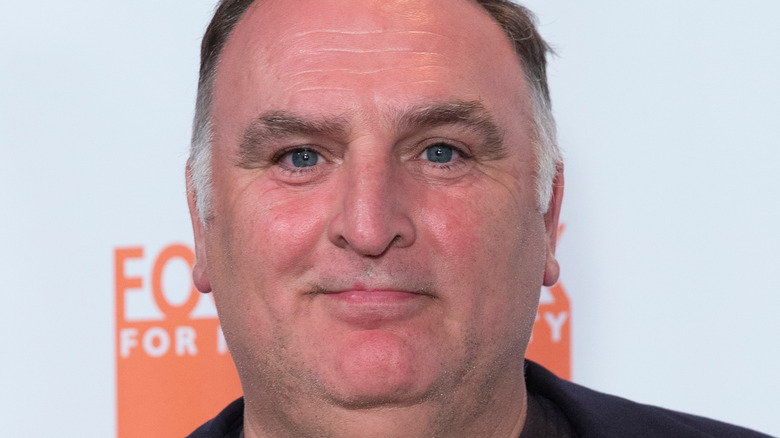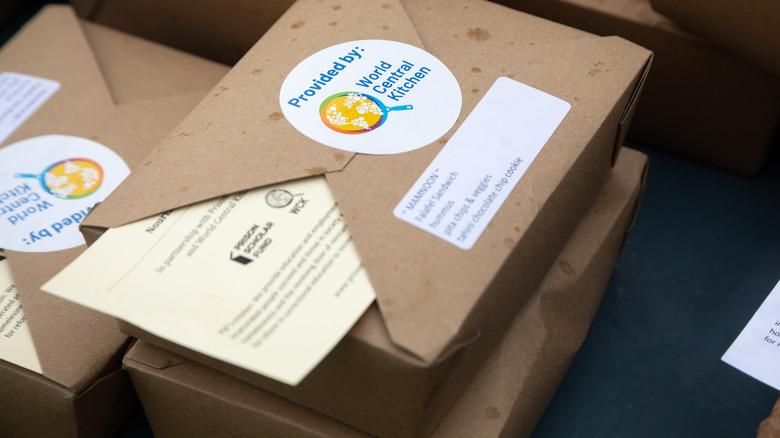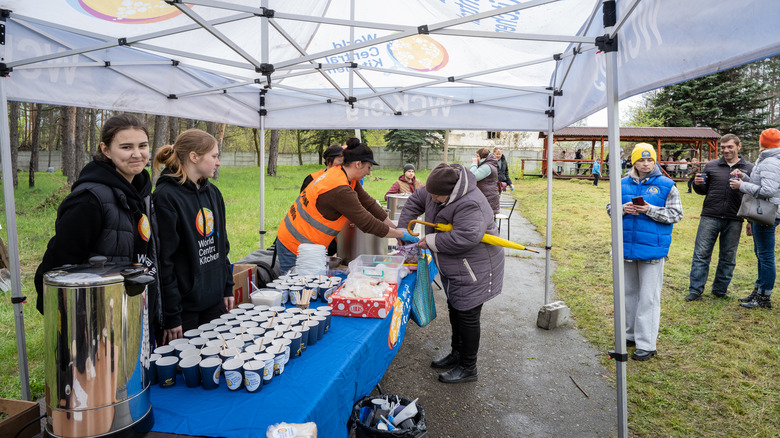How José Andrés Started World Central Kitchen After The 2010 Haiti Earthquake
A hot meal prepared by World Central Kitchen costs between $2.50 and $4. But, the impact the organization has had on communities in crisis around the world is priceless. Since its conception in 2010, WCK has worked in the Bahamas, Mozambique, Guatemala, Colombia, Venezuela, Tijuana, and countless other countries. It provided domestic relief too, helping curb food insecurity after the COVID-19 pandemic and feeding families displaced by Hurricane Ian in Florida last fall.
Founder José Andrés has become just as synonymous with his Michelin stars as it is with his humanitarian work. Andrés and World Central Kitchen were the subject of the documentary "We Feed People" directed by Ron Howard, which debuted at SXSW in 2022. The chef was nominated for a Nobel Peace Prize in 2019 for his work with WCK and was named Humanitarian of the Year by the James Beard Foundation in 2018.
So, what sets World Central Kitchen apart? The team is all about lending a helping hand on the front lines, a mission statement lived out by being among the first responders to various crises around the world. As Andrés recounts via the WCK website, "World Central Kitchen started with a simple idea at home with my wife Patricia: when people are hungry, send in cooks. Not tomorrow, today." "The World Central Kitchen Cookbook: Feeding Humanity, Feeding Hope" is a compilation of recipes and stories from the organization's relief work around the world.
The beginning of a revolution
It probably doesn't come as a surprise that a world-renowned chef like José Andrés has always had an interest in food. He cut his teeth working at El Bulli before the age of 20. But, Andrés' passion for helping folks in need extends just as far back. During his 20s, he volunteered at Washington DC Central Kitchen, later becoming the board chairman.
Fast forward to 2010. The chef hopped on a plane to Haiti, which had just been struck by one of the most devastating natural disasters in human history. Over 300,000 people lost their lives in an earthquake, and hundreds of thousands more were left without homes, resources, electricity, communication lines, or roadways.
There, Andrés saw the difference that nourishment made in restoring the health of people in crisis, but he also observed firsthand how the art of food revitalized people's souls and boosted morale in a more intangible way. He learned to cook black beans in the local Haitian style, taking time to replicate a familiar dish to comfort folks in need. But, most importantly, Andrés noticed that "we didn't have organizations led by cooks the same way we had rebuilding organizations led by architects or health organizations led by doctors," as he told Smithsonian Magazine. The same year, the Asturias-born chef founded World Central Kitchen using his $50,000 prize money from the Vilcek Foundation, which he received for his outstanding contributions to America as an immigrant.
Millions of lives changed in 13 years
Today, from storms to floods, earthquakes, volcanic eruptions, and war — you name it, WCK will be there (and has probably already seen it before). When Hurricane Harvey hit Houston in 2017, World Central Kitchen was there. It was there again in Puerto Rico a month later after Hurricane María, serving 3.7 million meals in the span of just nine months. That's nearly 14,000 meals per day, and it inspired Andrés' book "We Fed an Island." As WCK executive director Nate Mook told Smithsonian Magazine, "People ask, José, how do you get the food? He always looks at them like they're crazy. 'I'm a chef. That's what I do. I get food.'"
WCK was there on day one when a 7.1-magnitude earthquake hit California in July 2019. Five days later, Hurricane Barry hit Louisiana, and WCK sent chefs there, too. In perhaps its highest-stakes mission, the nonprofit worked in an active warzone in Ukraine in the summer of 2022 and was subsequently hit by multiple missiles, targeted by Russian airstrikes for their immensely helpful relief work. Undeterred, WCK went on to serve over 150 million meals in Ukraine by early September.
WCK isn't only doing immediate relief efforts, either. The organization has put its efforts toward long-term nutrition solutions as well, initiating the Clean Cooking program to help Haitian home cooks lower their reliance on dangerous open fires and shift toward safer heat elements. Andrés even opened a culinary school in Port-au-Prince.


